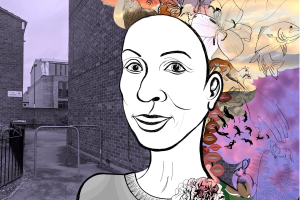Visual Artist Laura Spark talks about her creative captioning work for HERA Theatre’s show ‘We Ask These Questions of Everybody’

Crafted from transcripts for an assessment for the Department of Work and Pensions, HERA Theatre’s ‘We Ask These Questions of Everybody’, to stream online on Friday 29th January 2021, highlights the mental, social and financial pressures faced by disabled people in the UK, especially during this very difficult time. Presented as a verbatim opera, the online production offers an insight into a community often underrepresented. Visual Artist Laura Spark – who specialises in animations, projections and live visuals tells us more about her process for creating creative captioning for the show.
Hi Laura, you’re responsible for the creative captioning of HERA’s production We Ask These Questions of Everybody. How are you feeling ahead of the streaming?
Like there’s still a lot to do, but very excited to share it!
We Ask These Questions of Everybody is an online opera drawing on transcripts from an assessment for the Department of Work and Pensions to expose the emotional challenges faced by disabled people dealing with state power. How have you collaborated with HERA to create the visual element of the show?
It’s been great working with the Hera team. I’ve had the opportunity to collectively talk through design ideas with the team, and particularly the writer Toria Banks, via online meetings and email. It’s always really interesting talking about how to approach captioning, considering everything from legibility, to conveying emotion through fonts and how to create separate spaces with texture.
We also have an intern on the design team, Libby Welsh, and we’re working through different design ideas together. It’s often even more exciting to have someone to bounce ideas around with!
Have you learned anything new about yourself/the show’s subject matter/both whilst working on the production?
It’s always a real eye opener to hear the details of the DWPs process and assessment strategies and what disabled folks have to go through. It’s hard to know what to do sometimes to help and that’s why I want to help where I can and as best I can to lift the voices of my disabled contemporaries – and they are the best people to advise me on how to use my skills to do that. Thats also why we thought about bringing on an intern and made the call out specifically for disabled artists, as although I have the skill set for the job it is not my experience. I’m hoping that by working together we can create a better and more authentic experience for the audience whilst also creating opportunity for skill sharing.
You’re a visual artist, having trained at the Royal College of Art. How has this helped to shape you as an artist?
Doing a masters definitely helped me to think more critically and equipped me with more ways to approach making work – especially because my undergrad had been in drama so my visual art practice had been very much self taught. One of the best things about my time there was my fellow students – learning from and being encouraged by them was a game changer! One main thing I took away was the confidence to be able to talk about and show my work in progress to gain advice and feedback. And also just the confidence in general that my self taught process was as relevant as art graduates’!
You specialise in making animations, projections and live visuals for theatre, performance and installation. What has inspired you to create work for these mediums?
I’ve always loved theatre, and film, and really weird puppets! As a theatre student I saw a performance by puppet theatre company Faulty Optic, which led me to making lots of grotesque puppets, then I found the surreal animators Brothers Quay and Jan Švankmajer so I started animating my puppets. I don’t always work with characters now, but animation is all about bringing life through movement, so even if it’s working with text, you can still think in terms of performance. And I really love working with other artists, and theatre projects bring together so many creatives onto a single project!
What advice can you give to aspiring visual artists?
Hang out with contemporaries, online and in real life – work in shared studios, go to meet ups. Asking questions and learning from each other is a great way to learn! It’s great having friends who do different kinds of work and you can all come together to make projects and support each other but learning from people who have a similar role as you is also really helpful! No-one is competition, just learning buddies! And your imagination is your greatest asset and skill, always honour that over technical prowess!
What can viewers expect from the show?
Something beautiful made from something difficult. Something sonically radical and unique! I think it’s the kind of show that offers catharsis for those directly affected and insight and understanding for others. Maybe it will light a fire, and be a reminder for us all to be kinder as well as more alert, to help and hold each other, and to get political.
Questions by Lucy Basaba.
We Ask These Questions of Everybody will show as part of Sound Festival on Friday 29th January 2021, to subscribe to the festival’s YouTube channel, click on the ‘Booking Information’ hyperlink here…
To find out more about HERA Theatre, visit here…


Leave a Comment